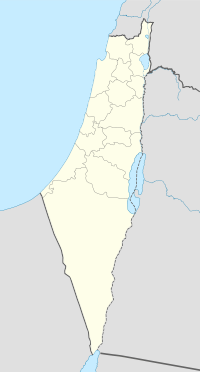Al-Khalasa
| al-Khalasa | |
|---|---|

The well at al-Khalasa
|
|
| Arabic | الخلصة |
| Also spelled | al-Khalasah, al-Khalus, Elusa |
| Subdistrict | Beersheba |
| Coordinates | 31°5′50″N 34°39′9″E / 31.09722°N 34.65250°ECoordinates: 31°5′50″N 34°39′9″E / 31.09722°N 34.65250°E |
| Palestine grid | 116/056 |
| Population | Not known, populated by nomads (1945) |
| Date of depopulation | October 1948 |
| Cause(s) of depopulation | Military assault by Yishuv forces |
Al-Khalasa (Arabic: الخلصة, al-Khalasah; Hebrew: אל-ח'אלצה, al-Khalatsah), was a Palestinian village, located 23 kilometers southwest of the city of Beersheba. The village was founded by the Nabateans under the name of "al-Khalus", and then "Elusa" under the Byzantines where it served an administrative center in the Negev Desert. It continued as a major town by its modern name "al-Khalasa" during Mamluk rule, but was abandoned sometime in the fifteenth century CE. It was repopulated by Bedouins in the early twentieth century, after western archaeologists took an interest in it. In October 1948, it was captured by Israel during the 1948 Arab-Israeli War. The population of al-Khalasa is unknown, but all of the inhabitants were Muslims, from the al-Azizma tribe.
Al-Khalasa was founded by the Nabateans in the early 4th century BCE as "al-Khalus" or Haluza. Roman historian Ptolemy identifies it as a town in Idumea west of the Jordan River. After the Roman conquest, al-Khalus was renamed "Elusa", and in the late Roman period it grew to become the principal town of the western Arabia Petraea province. It was the birthplace of Abraham Zenobius a prominent Rhetorician in Antioch. Elusa became one of the first Negev towns to have a large Christian population, and Christians and pagans lived side-by-side. The Bishops of Elusa participated in the church councils 431 and 451 CE. Tomb-stones found in the local cemetery indicate that there were pagans at Elusa as late as the early 5th century. In this period the city belonged to Palestina Tertia.
...
Wikipedia

